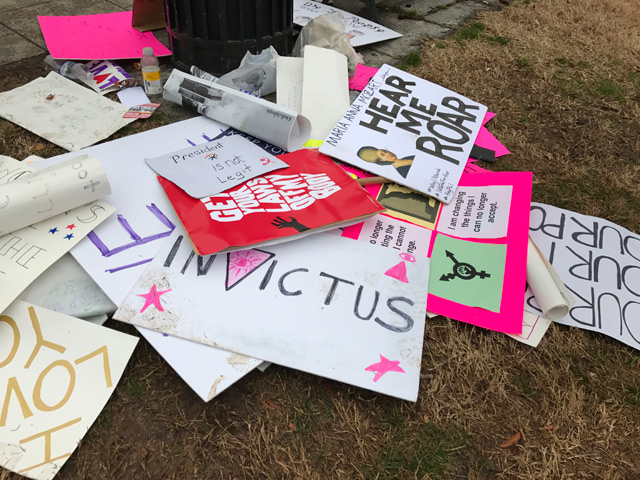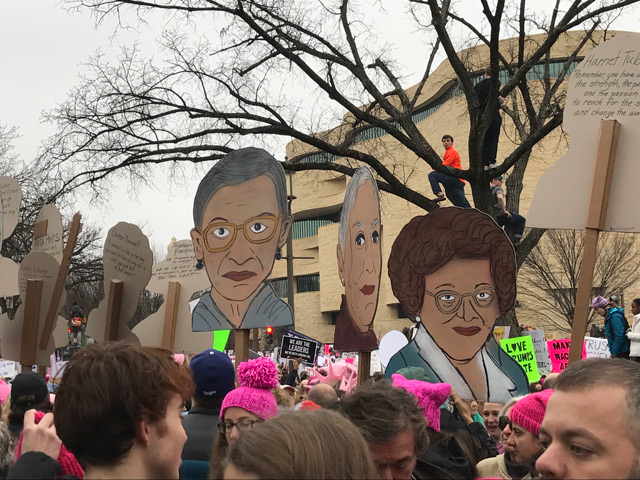The Women’s March Hangover
Saturday Was All Well and Good, But What's Next?

The day after the wildly successful Women’s March on Washington, I strolled through an emptied, overcast D.C. that was hung over from the dueling beatings it endured the two days prior. Most Trump voters and marchers alike had gone home, and those still in Washington were disappointed to find the Supreme Court and U.S. Capitol buildings closed. Not a great day for sightseeing. The city was resting, mourning, detoxing, or whatever you want to call it.
The only obvious question is, what now?
I thought about this on Sunday as I eavesdropped on a few older women at a bookstore casually exploring the question of the march’s lasting impact. Are we on the verge of a new movement? Or will everyone get on with their busy lives, and begin to normalize a Donald Trump presidency, like some Republicans who originally scorned him have already done?
I posed these questions to several people. One guy who wore a sign that read “Straight White Male Seeking Equality” said Trump will prevent progressives from “resting on their laurels,” as they might have had their candidate prevailed. He supposed, “Sometimes you have to go through dark periods to end up somewhere better.”
When I asked another women, an architect from L.A., she simply pulled out her smartphone to show me the sign she had worn at the march: “Abort Donald Trump Before 20 Weeks,” with a drawing of an orange fetus. That’s five months to do something, but what is that something? I wondered.
At a bar on Saturday night I met three middle-aged businesswomen from Philly — the director of a nonprofit, a surgeon, and a CEO. They were still glowing from a spectacular day of marching. Like so many, their expectations had been exceeded. I emailed one of them later to ask the question of staying power. She said she plans to email her senator daily. “Like brushing my teeth.” She said she always felt okay under the “likes of a very limited President Bush,” but this is different. Trump is a dangerous sociopath. Did the march give her hope? “Yes,” she wrote. “But we need to move forward. That is the challenge.”

On Sunday, walking by the street vendors selling political paraphernalia, a friend of mine jokingly wondered how long it would take for hipsters to start wearing Make America Great Again hats. It could be a way to reclaim the word “great,” which now almost sounds ironic. I wouldn’t count on it anytime soon. The vendor told me she was not surprised in the slightest that Trump won: During the campaign, no one had been buying Hillary Clinton merchandize, but Trump gear was flying off the shelf.
But the aerial images of the streets of Washington D.C., Los Angeles, Santa Barbara, Salt Lake City, Dallas, Boston, La Paz, Cuenca, Moscow, Singapore, among more than 600 other cities speak for themselves.
I also remembered a more pensive sign: “Don’t mistake privilege for progress.” When I talked to the woman holding it, she said she felt uplifted by the diversity she saw. It is important to remember that 53 percent of white women voted for Trump, she noted. “I don’t understand it,” she said as though she were trying to. As for traction, she said she was “hopeful-ish.”
But at the same time she expressed anxiety about the way in which the rest of the world would come to view the day. It was a unique position because everyone else seemed to be so purely overjoyed that the whole world had no choice but to pay attention. The number of marchers clearly trumped those at the inauguration.
As a part-time insomniac, I find myself awake on my last day in D.C., listening to winds howling outside of the windows, before any nearby coffee shops have opened or my Airbnb hosts have gotten up on this wintery Monday morning. Is it just another Monday morning, when we begin a fresh workweek? Will we soon feel secretly tired of the march photos that some friends will continue to share on Facebook? When is the next march? People are already tweeting about the possibility of April 15 in honor of the fact Trump refused to release his tax returns.
No one of course really knows what’s next for this movement still in its infancy. The other problem with the “obvious” question is, as the Washington Post noted, nothing has been obvious about this campaign. Had Clinton prevailed, the excitement of her historic achievement would certainly have not evaporated quickly, but we would have eventually normalized a female president. Even Trump’s supporters, though, believe he will continue to stun us every single day. As our leading “creepy tweeter,” as protesters chanted, it will be impossible to normalize him.


